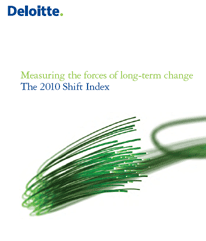THE BIG SHIFT INDEX™ Corporate returns are under pressure from far more than the recession. The patterns we’ve uncovered span decades and deeply affect even the highest performing companies, with the single greatest driver of these challenges, and indeed future opportunities, being our underlying digital infrastructure. Regardless of when the economy shifts back to an upturn, the long-term implications for continued erosion of return-on-assets will continue. We developed the “Shift Index,” a new economic indicator that suggests the current recession is masking long-term competitive challenges for U.S. businesses. DOWNLOAD THE 2010 REPORT HERE » DOWNLOAD THE 2009 REPORT HERE » Among the key findings, U.S. companies’ return-on-assets (ROA) have progressively dropped 75 percent from their 1965 level despite rising labor productivity. Even the highest performing companies are struggling to maintain their ROA rates and increasingly losing market leadership positions. Deloitte’s Shift Index pushes beyond cyclical measurement and looks at the long-term rate of change and its impact on economic performance. The Shift Index tracks 25 metrics across three sets of main indicators:
These three indexes combine to provide a measure of economic performance specifically designed for the digital era — focusing on the computing, storage and bandwidth technologies and the practices and protocols of those technologies, which define our new infrastructure. Deloitte’s Center for the Edge also views these indicators as phases of transformation in what it calls the “Big Shift” in the global business environment. Foundations: Digital Infrastructure and Economic Policy Lead the Way The adoption rate of digital infrastructure is two to five times faster than that of previous infrastructure such as electricity, railroads and telephone networks. Changes currently manifest themselves as challenges rather than opportunities because our institutions and practices are still geared to earlier infrastructures. Key metrics in the Foundations Index track the changes in technology components underlying the digital infrastructure, growth in the adoption rate of this infrastructure and long-term public policy shifts. Changes in these foundations have significantly reduced the barriers to market entry and movement, leading to the increase in competitive intensity. Knowledge Flows: Key Drivers of Performance The Flow Index focuses on the key drivers of performance in a world increasingly shaped by digital infrastructure. This includes both physical and virtual flows of knowledge, capital and talent enabled by the foundational advances as well as the amplifiers of these flows. Such amplifiers include the increased use of social media and the degree of passion with which employees are engaged in their jobs. Developments in this second wave will likely lag the foundations metrics because of the time required to understand changes in foundations and develop new practices consistent with opportunities. Improving performance starts with recognizing that knowledge flows can help a company gain a competitive advantage in an age of near-constant disruption. The number and quality of knowledge flows at a firm — both within the organization and especially across institutions — will be a key indicator of any company’s ability to master the Big Shift. Impact: Rising to the Challenge The Impact Index measures how well companies are exploiting the foundational changes in the capabilities of the digital infrastructure by creating and sharing knowledge and what impact those changes are having on markets, firms and individuals. According to Impact Index metrics:
This third phase in the Big Shift provides the greatest lagging indicator because of the time it takes for foundations and knowledge flows to play out across equity markets, consumer choice and the value captured by talent. While current trends in firm performance indicate a sustained deterioration, over time, corporate performance is expected to improve as companies learn how to effectively participate in and harness knowledge flows. |
- - - - - - -
(c) 2005-2011 John Hagel III and John Seely Brown. All Rights Reserved
- - - - - - -
site design & management: Christian Sarkar

